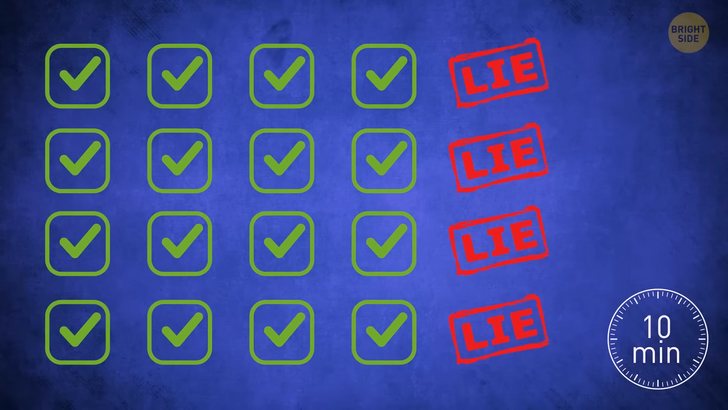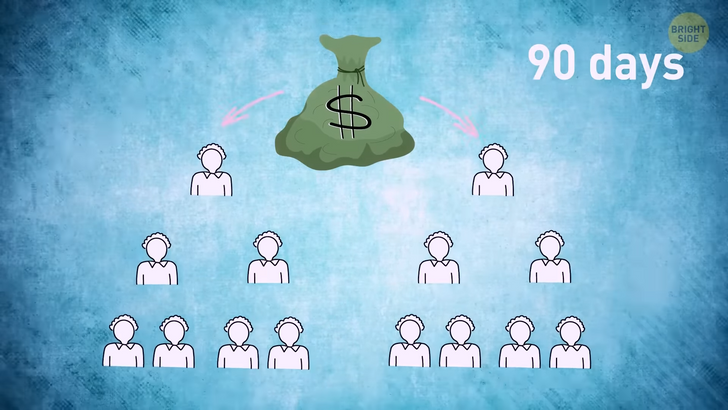10 Dangerous Self-Care Mistakes We Make When Trusting Beauty Bloggers

White lies, black lies... No matter what intentions you have, if you don’t tell the truth, it’s a lie. But why do we lie after all? Let’s face it: we’re all liars. We all say innocent lies every now and then.

According to a survey, most commonly, in 21% of cases, people lie to avoid others. Next up — 20% — are lies perceived as humor, jokes, or pranks. 14% of lies are told to protect oneself, while 13% of lies are told to impress others and appear more favorable. 11% of lies are invented to protect someone else. I guess this 11% is white lies, huh?
Fun fact is that 5% of all lies go to the category of unspecified ones. It means that 5% of all lies had no meaning at all. We lie the most to our closest people: our friends — in 51% of cases and family — in 21% of cases. And how often do we lie?
There are several research studies about it. Here’s the first one, and it’s pretty positive. Researchers even tried to count how often an average person lies. The study has found that day-to-day communication is usually pretty honest. According to the results, people normally lie once or twice a day.

Also, the same study revealed that there are quite few prolific liars, only about 1%. Prolific liars tend to lie at least 15 times a day. So, we have some good news here: most people seem to be honest. But there was disappointing research disproving this positive news.
According to a psychologist from the University of Virginia, lies are a condition of life. The research reveals the painful truth: we lie in every one in five social exchanges that last over 10 minutes. There’s even more: we lie to about 30% of people we have conversations with. Now let’s make a short trip inside your brain to see what happens when we lie.
Whenever we do that, three key parts of our gray matter get stimulated. The first part is the frontal lobe, it’s right here. The frontal lobe is the center of our personality. It’s the part that’s responsible for our voluntary movements, for the expressive language, and it also has the superpower to suppress the truth. The thing is — the frontal lobe is all about intellectual activities.

Next up — the limbic system. Before I move on with this one, I have a question. What do you feel when you lie? Is that guilt, because you understand lying is bad? Or maybe stress — because you’re subconsciously afraid that they’ll figure out you lied?
The spectrum of emotions may be pretty vast, but no matter what exactly you feel, it will still be anxiety-related. The limbic system is all about the behavioral and emotional responses we have. The last but not the least — the temporal lobe, which is also essential for lying. The temporal lobe helps with mental imagery. It also helps retrieve older memories. The functions that the temporal lobe has make your lies sound plausible.
These were the three main parts regulating the lies we tell, but they have some helpers. For instance, this area helps monitor mistakes, which is pretty important when we lie. And this area works hard when we lie as well since it helps control our behavior. As you see, lying is a very demanding and tiring process that involves many areas of your brain.

Now let’s take a look at the brain of a person who’s telling the truth. Look here, the frontal lobe’s chilling. It doesn’t need to distort reality and suppress the truth. The limbic systems feel pretty relaxed too — there’s no lying-related stress. Yeah, telling the truth requires way less effort and energy.
We’re now in a typical office. You can see managers, clerks, and the boss. Who do you think hears more lies than any other person in here? If you think it’s the boss, you’re probably right. There’s no precise statistic about who is lied to most often, but A survey of over 1,000 Americans revealed that 96% of respondents typically lie to get out of work. Therefore, they lie to their bosses.
You must have made up an excuse about feeling sick at least once in your life too. Like, you wake up, but you don’t feel like going anywhere. You know that there’s nothing super important at work, and you can take a sick leave for a day. You call your boss, you lie, and you feel guilty or stressed — what if they find out you lied? You trigger your limbic system — you know it already. You’re kinda afraid to go out, even though you wanted to go shopping — what if someone sees you and tells your boss?
Statistically, the chances your boss is gonna know that you lied are pretty slim. The same survey revealed that 91% of people who lied to get out of the office were never caught. Don’t take it as directions — remember there’s still 9% of the people who were caught indeed. And don’t forget about Murphy’s Law. Anything that can go wrong will go wrong. At the worst possible time. So lying isn’t always an option.

Most lies are white lies. I mean, even if you lie to get out of the office, it’s not good, but it’s not a big lie. In fact, there are only about 11.4% of big lies. All the rest is pretty innocent.
But if someone makes their living exclusively by lying and deceiving others, that’s serious. History knows examples of when people made a fortune off of lying to people. There are quite a lot of con artists, but I’m gonna tell you about Charles Ponzi. He must have had some crazy frontal lobe — I mean, he was an incredibly talented liar.
He deceived so many people and earned so much from his lies that today there’s even a type of fraud called the Ponzi scheme. It all happened in New England, in the 1920s. Charles Ponzi tricked hundreds and hundreds of people into investing in a scheme. It was a postage stamp speculation scheme.

He offered something people couldn’t resist. He promised the investors that they would have a 50% return in a very short period, namely 90 days. It’s like: you have $1,000. You use them to participate in a scheme, and three months later you get your money back plus the interest of $500.
You don’t need to work, wake up early, or do anything. It’s like a potted plant: you just have to wait until it blooms. And what if someone has not $1,000, but $10,000 or even $100,000? The interest would grow proportionally. Now it’s hard to believe that someone intentionally gave their money to Charles.
But hey, Charles Ponzi was the first person ever to have created such a scheme. He used people’s main weakness — laziness. Let’s admit it, we all would be happy if we didn’t have to work and could have everything we need.

Now let’s see why this scheme worked well at the beginning. People spread the word and each day new investors would bring Charles more money. Charles had a 90-day gap — so by the time he was to pay the first investor back, he had cash from new investors who still needed to wait to get the money with the interest back.
So there was a pretty illusion of a successful and honest business at first. Happy investors who were the first bricks into that wall of lies and who got the money and the interest back would tell everyone about their positive experience, making people want to invest too. Charles Ponzi reportedly racked up about $250,000 a day.
I know, it sounds crazy. Don’t forget I’m talking about the 1920s, so today’s equivalent is about $3 million a day. The scheme didn’t work out for sure, but that was just an example of one of the greatest lies in history. And how often do you lie?











